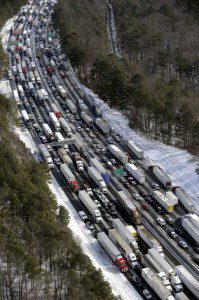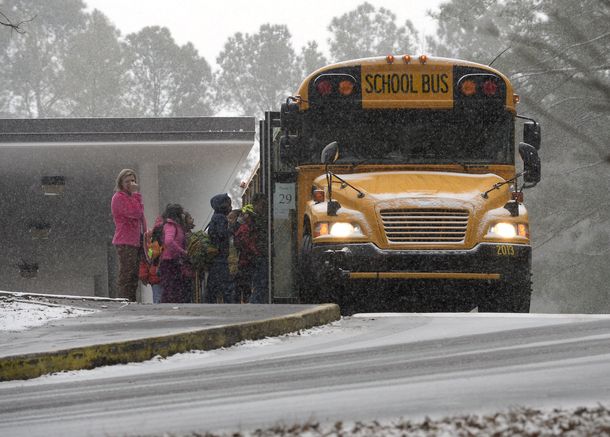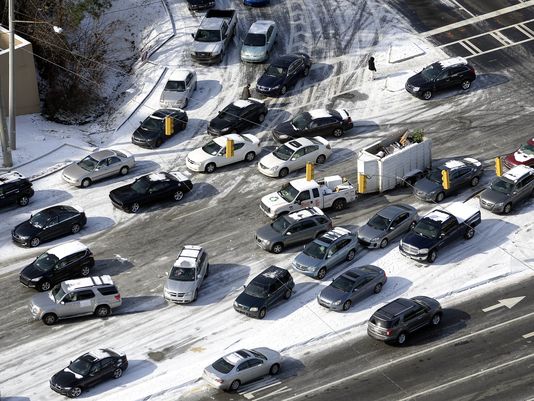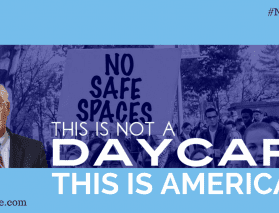Sometimes stuff happens. Circumstances collide unexpectedly. Snow falls further north than the computer models predicted. Events reminds us that we are not in control. And we don’t like it. Not one bit.
The great Atlanta snow storm of 2014 reminds us that some things are outside of our control.
As a recent transplant to Atlanta area from the snow belt of Cleveland, Ohio, I’m used to getting around in snow, unlike most of the people in Atlanta. Snow only arrives like this every few years. Maybe.
But although I suppose I could poke fun at their lack of snow-driving skills (and maybe I should a little bit) that really wasn’t the problem on Tuesday, January 28, when the snow arrived. I was in Northeast Atlanta area in Norcross when it started to fall, so I got a first-hand look at the conditions.
A few things those outside of Atlanta should know — and critics within Atlanta should remember:
- None of the weather forecasts I saw predicted more than flurries for metro Atlanta. The snow storm was supposed to stay farther south.
- The weather that morning was sunny and clear. You never would have expected a snow storm to arrive based on what you awoke to that morning.
- The snow arrived mid-day so that most people were already at work or school when it became obvious the storm would bring more snow than expected.
 As we left our lunch at The Forum in Norcross around 2 PM, all the shops were already deserted. But the streets were full. School began dismissing early in an effort to get kids home before they became stranded. They were not all successful. At the same time, people began leaving work in droves all over metro area, both to pick up their children from school and to get home before conditions worsened.
As we left our lunch at The Forum in Norcross around 2 PM, all the shops were already deserted. But the streets were full. School began dismissing early in an effort to get kids home before they became stranded. They were not all successful. At the same time, people began leaving work in droves all over metro area, both to pick up their children from school and to get home before conditions worsened.
As the snow fell, it melted. As it melted, it froze. Anyone with experience in winter driving will tell you that these conditions are among the worst. Snow is one thing. Ice is quite another. The only antidote for icy conditions is to go VERY SLOW and don’t change speed or direction. Stopping doesn’t work all that well on ice.
So we had stop-and-go traffic on ice forming as quickly as the snow fell. Frankly, there isn’t much you can do about it. The Atlanta area doesn’t exactly maintain a fleet of plows and salt trucks for such rare conditions. Taxpayers would protest having to fork over the additional expense to do so.
So you put all of Atlanta on the roads at once in conditions that require them to go extremely slow (something they are not used to doing, by the way) and you have, not surprisingly, gridlock.
I chose to stay put in Norcross, by the way, at the home of a generous friend rather than risk driving in such conditions. I also had only a pair of Crocs for footwear, a sign of my own lack of preparation that would make my friends in Ohio laugh hysterically.
Answering the Critics
The question of the day here in Atlanta is “Who is to blame?”
Some say the mayor, some say the governor, some say the school leadership that failed to close schools that day or dismiss kids in a more systematic fashion. Others take the opposite approach and say personal responsibility is the key. “Quit blaming the government and make your own decisions!” Certainly there are some valuable lessons to be learned here about being prepared for emergencies.
But my take has been a bit different. Rather than rushing to place blame, the great Atlanta snow storm of 2014 has reminded me of the simple truth: we are not in control of everything.
Sometimes events happen that are beyond the control of human beings. We can’t predict them or fully prepare for them. Sure, we can all look back and see where we could have done better. And we can avoid take foolish risks and practice patience when in the middle of such circumstances.
But some things are outside of our control. We are not God. Deal with it.
The Rush to Blame
I don’t know if it’s a human thing or primarily Western thinking that moves us to place blame for everything. But consider the blame being directed at school officials, an area I know abit about after leading a school in Ohio for a dozen years.
 If a school official had cancelled school Tuesday morning — when the skies were clear and forecasts predicted only light flurries — parents would have been up in arms at the prospect of re-arranging child care, changing work schedules, etc.
If a school official had cancelled school Tuesday morning — when the skies were clear and forecasts predicted only light flurries — parents would have been up in arms at the prospect of re-arranging child care, changing work schedules, etc.
If officials hadn’t tried to dismiss early, even more kids would have been stranded on the roads in buses or at the school all night (as many were). There is no good scenario in such situations, only various shades of “less than ideal.” They respond as best they can to events as they unfold. But blaming them isn’t the best response.
Just for once, I’d like us as frail human beings to acknowledge that there are limits on what we can do. I don’t mean that we should crawl into a hole and quit reaching for the stars and all that. Of all people, I believe that we should never stop believing. But our belief must be grounded in reality –and the reality is that we are not ultimately in charge.
In a fallen world, the skies are not always blue, snow doesn’t fall when scheduled, and salt and snow removal equipment are finite and unable to magically appear everywhere with a tap on our iPhone.
A Test of Faith and Community
When such times come, our faith gets tested in two directions. We find out if we really trust the One who maintains the storehouse of snow. And we discover how much we need to trust one another in community to find shelter in a storm. In this case, the storm came in the form of unexpected snow and ice. But life throws a lot of storms our way, not all of them weather-related. Times like these remind us that we are not alone — nor should we be. We need one another.
The great Atlanta snow storm of 2014 may be over — even if you haven’t yet found your car on the parking lots that used to be interstates. But we can be sure that it won’t be the last time life throws us something unexpected that stretches our faith in God and one another.
I only hope we learn the lesson that not everything is within our control so we can focus on learning and preparing together for next time — rather demanding someone get blamed.
Do you agree that we are too quick to place blame for circumstances beyond our control? Share your own story of your experience in this storm or other experiences that revealed your limits with a comment below.













